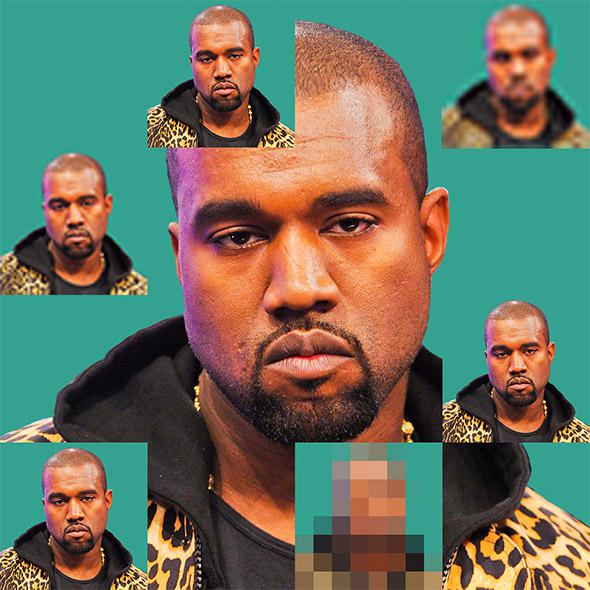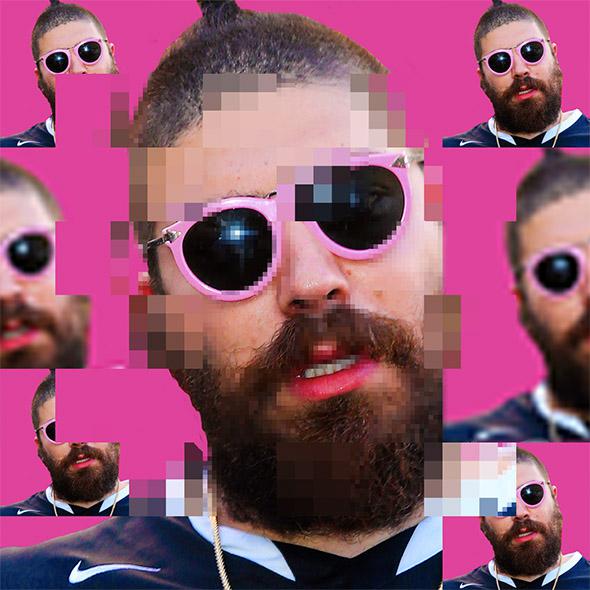Josh Ostrovsky paid his dues in the trenches of Internet fame. He got a wacky haircut and called himself “The Fat Jew.” He performed as a novelty rapper. He judged a wet T-shirt contest for pregnant women. He emceed a Mike’s Hard Lemonade product launch. He staged a SoulCycle session for homeless people on a bank of New York Citi Bikes. And he churned out meme after meme on his Instagram, @TheFatJewish, pushing for his online following to reach the critical mass necessary to launch an Internet celebrity to real stardom. “I’m getting ready for life beyond Instagram,” Ostrovsky told a reporter last month after his follower count broke 5 million. “I can still be cool from the mainstream.”
But over in the world of mainstream celebrity, some had already decided that Ostrovsky was not cool, and that he should have no career beyond Instagram. For years Ostrovsky had evaded accusations that his online empire was built on jokes he’d stolen from other comics and recycled without attribution—Twitter jokes copied verbatim, original Web comics blatantly cropped to remove the author’s signature, stuff like that. (He didn’t return a request for comment on this story). At first, his career prospects—tweeting about a “legendary” night sponsored by Bud Light, monetizing his toothless dog’s social media accounts—seemed like punishment enough. But this summer, Ostrovsky launched the novelty wine label White Girl Rosé, starred in a Showtime reality series, landed his own Apple radio show, inked a plus-sized modeling contract with Bar Refaeli’s agency, got a runway show at New York Fashion Week, teased the hardback cover to his forthcoming comedic memoir, and signed with a top Hollywood talent agency—all while continuing to “aggregate” other people’s jokes on Instagram.
So after Ostrovsky lifted a Cecil the Lion joke from stand-up comedian Davon Magwood’s Twitter feed late last month and reposted it on Instagram verbatim and without attribution, an all-star lineup assembled to stop Ostrovsky’s rise. Silicon Valley’s Kumail Nanjiani tweeted, “As @FATJEW once said, ‘I have a dream.’ ” It’s Always Sunny in Philadelphia writer Patrick Walsh called Ostrovsky a “loser.” Childrens Hospital’s Rob Huebel guessed that he’s “probably a piece of crap.” Difficult People’s Julie Klausner praised his “cool hairstyle that is extremely cool,” but she was only kidding—she doesn’t think it’s cool. When Ostrovsky, 33, finally addressed the charges in an interview with New York magazine on Friday, he pinkie-swore that he’d never deliberately stolen a joke. “I didn’t realize that if you don’t have a source for something, then you couldn’t necessarily post it,” Ostrovsky shrugged. “I don’t think that was always clear. I’m very on the cutting edge of the internet. I’m up on a lot of the newest shit first.”
People have been stealing jokes as long as people have been telling them. Because comedians have little legal recourse when their jokes are stolen—taking a copyright case to court can cost hundreds of thousands, even millions of dollars—stand-up comics protect their jokes by establishing and enforcing an internal code against blatantly ripping each other off. Shaming can be pretty effective: In 2007, Joe Rogan jumped onstage during Carlos Mencia’s Comedy Store set and accused him of ripping off other guys’ bits. Soon, Mencia’s star had fallen from Super Bowl commercial famous to weight loss band infomercial famous.
But the Internet has accelerated the joke-stealing process. Now, a shameless social media personality can copy and paste jokes on Twitter in seconds—no need to book a comedy club gig or land a late-night TV appearance—and rack up thousands upon thousands of followers who don’t know where the joke came from. Comedians are now seeing their jokes stolen online by pastors, musicians, reality television contestants, and pop culture “curators” like Ostrovsky, all of whom can benefit from the follower boost that comes with posting funny tweets—and who are not affected professionally by the comedy-world norms that keep stand-ups from stealing. Why not? As one Twitter user said of the plagiarism controversy raging around the stolen jokes he loves to read: “WHO CARES.”
Ostrovsky may be the thief of the moment, but there’s a whole online ecosystem of joke stealing lurking behind his account. The biggest player in Instagram aggregation is 9GAG (at 19.3 million followers, it’s more than three times the size of @TheFatJewish), which was launched by a University of Hong Kong student in 2008, and publishes a new comedic and/or heartwarming meme every few hours (new as in new to 9GAG’s Instagram, not new in the world). Then there’s @FuckJerry (5.9 million followers, including Kim, Khloé, and Kourtney Kardashian), run by the 24-year-old Elliot Tebele, who also has his hands in a host of other jokey Instagram aggregators like @FuckJerry.tv (1.1 million followers), @KanyeDoingThings

Photo illustration by Lisa Larson-Walker. Photo of Kanye West by Craig Barritt/Getty Images.
(662,000), and @JetStreamOfBullshit (329,000). New York stylist Jessica Anteby is better known as aggregator of the meme-y Instagram @beigecardigan (1.3 million followers). Jokes also churn endlessly through the big social aggregators—Reddit, Imgur, Tumblr—as well as dedicated hack joke repositories like Funny Status, Silly Facebook Statuses, Sickipedia, and Status Stalker, which says it wants to empower every Facebook user to make his “friends laugh” instead of just “posting what you had for lunch.” Twitter aggregator FavStar is a favorite among online comedians because it surfaces the day’s most popular (often: funniest) tweets on a rolling leaderboard—which in turn makes it a popular destination for joke thieves.
Then there’s Twitter, where generic joke accounts like @MensHumor (3.47 million followers) mingle with celebrity-branded “parody” accounts like @WolfpackAlan (942,000 followers), which is styled after Zach Galifianakis’ The Hangover character, but it doesn’t matter—it just publishes random memes with commentary like “yup.” One of the watchdogs behind @PlagiarismBad, a Twitter collective launched to identify and document online theft, told me that some of Twitter’s most pervasive plagiarists are the generic joke Twitter accounts designed to look like blandly pretty girls with less-than-fully-realized personalities. These accounts borrow avatars from the emoji keyboard or Disney princess movies; they tweet constantly, even at times of day when a real teen girl would be in class or sleeping; and almost everything they say is plagiarized. @TweetLikeAGirl (1.4 million), for instance, is set up to churn out cute digital mementos or girlish jokes every few minutes. “MOM I’M AN ADULT I CAN STAY OUT AS LONG AS I WANT but please schedule my dentist appt” is a recent hit blatantly stolen from a real teenage girl.
@TweetLikeaGirl is actually a University of Tennessee undergrad named Cameron Asa. Like most owners of these feminine joke accounts, he’s a dude. (See also: @FemaleTexts, run by a chic French teenage boy, and @Flirtationship, created by a 17-year-old guy from Singapore). Asa considers publishing “relatable tweets for girls” a business, he told BuzzFeed, and he populates his feed not by actually relating to real women, but by scraping aforementioned joke and meme sites—along with the other girly spam accounts—for dozens of lines that he sets to publish throughout the day.
On Black Hat World, a message board where people share tips on making shady money off the Internet, these “parody” account owners advise each other on which stereotypically female interests are best to focus on (“boys, shopping, make up, cheer leading, whatever”), make pacts to retweet each other’s content several times a day, and share downloadable files of thousands of “joke tweets” for easier spamming. When one parody account newbie asked the board if he needed to rephrase the jokes he’d “scraped from users” before he started “tweeting them as my own,” veterans assured him it wasn’t necessary. The rookie was relieved: “you’ve saved me hours upon hours editing & rewriting,” he said.

Photo illustration by Lisa Larson-Walker. Photo of “happy young caucasian woman” by iStock/Thinkstock.
The parody account holder’s end game is to amass enough followers to sell sponsored tweets—many of the girly spam accounts are riddled with tweets about knockoff Victoria’s Secret bras and shady diet pills—or else sell the account wholesale when it reaches an impressive follower count. Upon sale, these accounts can be flipped to the buyer’s chosen name, and overnight the millions of people who followed some @CommonWhiteGirl for her jokes are now subjected to whatever the highest bidder wants to tell them. While most people who launch a parody Twitter fail to turn a profit, an account that gains traction can net the owner a six-figure annual income and command an absurd amount of influence online. BuzzFeed calls the upper echelon the “Parody Twitter Illuminati.” And unlike guys like Ostrovsky, the shadowy anonymous figures behind these accounts don’t even need to pretend to value their reputation, because the personas they’re tweeting from aren’t even real.
In July 2014, comedy writer Maura Quint was listening to a song that had been sent to her by an ex, and thinking about how breaking up with someone can mean losing your appreciation of the songs you shared together, too. She distilled the thought into a line, thumbed over to Twitter, and wrote: “Wanna come over and ruin some songs for our future selves by attaching eventually painful memories to them?” Soon it was one of her most popular Twitter jokes ever—it’s since been retweeted more than 1,500 times and favorited by more than 3,000 people—but it also spread widely without attribution, ricocheting between Tumblr blogs before launching back to Twitter and getting sucked into the orbit of a few “huge thieving accounts,” she told me. When Quint complained to one massive generic joke account that had lifted the line, the anonymous owner didn’t just admit to stealing her joke—he promised to steal all of her jokes, and then he blocked her. Says Quint: “He was a douche, excuse my language.”
In many ways, Ostrovsky’s operation is not so different from that of these young spammers. His Instagram and Twitter accounts are branded with the “Fat Jew” persona, but the content is largely collected by a team of anonymous interns who Ostrovsky says work out of the waxing room of a Queens nail salon. Ostrovsky plays his interns both ways: When promoting his brand to Katie Couric in March, he said that his account is filled with “a lot of stuff I actually make myself.” But when he’s accused of theft, he blames his interns for stealing other people’s work—or else he shames the content creators themselves for failing to understand the new norms of the Internet. After television writer Patrick Walsh complained that Ostrovsky had blatantly stolen Walsh’s material, Ostrovsky tweeted back: “It was on a blog dude.”

Photo illustration by Lisa Larson-Walker. Photo of Barack Obama by Joe Raedle/Getty Images.
Still, a part of Ostrovsky is indeed human, and he’s now pinkie-swearing that he’s changed his ways. “There will never again be a photo that’s unattributed,” he told New York. “And honestly, if I can’t find a source, I won’t post the image, because that’s not what I’m all about.” So who has he been crediting lately? Since the scandal broke, Ostrovsky has cited such dubious sources as @Uptowndogfunk, a dummy account created just a couple of weeks ago, which exclusively tweets jokes stolen from respected Twitter comics; the Tumblr user “showerthoughts,” which seems to be a random personal blog that petered out in February 2009 and never actually posted the material Ostrovsky says it did; and Ostrovsky’s real-life pal @SlutWhisperer, who, again, never posted the image Ostrovsky claims he originated.
Ostrovsky’s lazy solution is already setting the new standard for aggregators: @FuckJerry owner Tebele has recently appended nonsense attributions to some of his posts, too. Think of this like tweet laundering: An aggregator who wants to side-step accusations of plagiarism but doesn’t want to do the work of actually tracking down the person who originated a viral joke—or else doesn’t want to alert the creator that he’s lifting her images and words without payment—can instead cover his tracks by crediting dummy accounts or random users. Eventually, it becomes so difficult to trace the joke back to its source, even committed anti-plagiarists throw up their hands: “I don’t have time for this shit,” Joe Rogan tweeted after trying to follow one convoluted trail of theft.
On the rare occasion that Ostrovsky does cite the legitimate source of an Instagram post—recent triumphs include shout-outs to Tumblr account Beyonce’s Asshole and Instagram @friend_of_bae—it becomes clear why it’s such a bummer for him to reveal his sources: Ostrovsky’s supposedly brilliant secret for spotting dank memes is … just … following a couple of other big aggregators on social media and reposting whatever they find. Luckily for Ostrovsky, few of his fans seem to care where the jokes are coming from, so long as they’re served to their Instagram feeds on schedule. “I mean I’m sure it matters for the people who came up with the jokes!” one aggregator fan told me. “It doesn’t matter for me, though.”
In 2013, Patton Oswalt told the story of a comedian he knew in his early stand-up days who blatantly stole a friend’s material. He got away with it for a while, “But when it came time for him to make the transition to television, to movies, to big-time fame and success?” Oswalt writes. “He had nothing.” Without an original idea of his own, his career went kaput. But Ostrovsky is attempting to chart a new course to fame, one where his followers are more valuable than his ideas. “This is what’s stressful about it,” Magwood told me. “The comedy community will police itself.” But people like Ostrovsky “don’t care about comedy. And most of the people in power at entertainment companies are just thinking, ‘Oh, you have 5 million followers. Bring them over to buy our stuff.’ ”
These days, it seems that the further Ostrovsky wades into the mainstream, the less people seem to understand or care what the comics are griping about. Earlier this week, Today show reporter Sheinelle Jones set out to interview Ostrovsky about the controversy and ended up lounging with him at the spa and downing glasses of White Girl Rosé. Back on the Today set, Jones absolved Ostrovsky of his sins: “He’s totally smart. He totally gets it. He frankly just likes to have fun. And he’s a fun guy to be with!”
